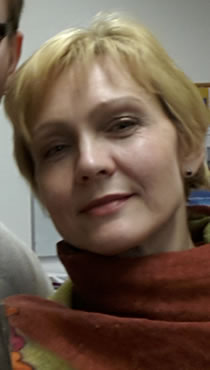-

Viktoriya Panchenko Kolp Angiolini was born in Chernihiv, Ukraine, on 21 April 1963. She died prematurely, of cancer,in Pisa, Italy, on 7 January 2014, at 51 years of age. Her father was a pilot in the Soviet air force, which her friends laughingly remarked, gave her a stern core of military discipline in seeming contrast with her very feminine persona. Her mother was an economist, and worked in the postal service in the town of Pryluky in north-central Ukraine whereViktoriyagrew up. In 1989 she received her degree, with highest marks, from the Faculty of Philology of the "T.G. Ševčenko" State University of Kiev. Her degree in Slavic Philology allowed her to teach the Ukrainian and Russian languages. During her final years as a student, she taught Ukrainian language at the N240 secondary school of Kiev; afterwards, from 1989 to 1995, she participated in research in the Phonetics Laboratory of the State University of Kiev, work which resulted in several publications. From that time until 2000, she served as secretary to the Dean of the Language Faculty of the State University of Kiev where her duties included organizational and public relations responsibilities as well as administration.
-
She married and had two children, Andrii and Inna Kolp.
-
At the beginning of the new millennium she came to Italy, a country which fascinated her and of which she subsequently became a citizen. She found both employment and new friendships by teaching Russian and interpreting, both in language schools (the “Agorà” circle in Pisa) and privately. In the late summer of 2004 she began to work with Katherine Isaacs at the University of Pisa, who was then participating in the “Tuning” project, coordinating the European History networks, and also starting what would turn out to be a long term involvement in higher education reform in Central Asia. Viktoriya’s linguistic, organisational and diplomatic abilities made her an essential part of these important international endeavours, and her engagement in them and her competences continued to grow until her death. She helped to design and to run the “Bologna.kg” Tempus projects (2005-2007), which included creating competence based reference points for university studies in 11 subject areas and the establishment of information centres on the Bologna process in the Kyrgyz Republic; she helped to edit many of the publications of the Sixth Framework Network of Excellence CLIOHRES, coordinated by Prof.Isaacs. Her falcon eye allowed her to edit all the volumes in Slavic languages, and to root out typos and other errors and inelegancies in other languages as well. She was involved, with professor Isaacs and professor Elda Garetto of the State University of Milan, in carrying out the RHUSTE project, which included ‘tuning’ the subject areas of History and Culturology in the Russian Federation. She then participated in designing and running the large-scale regional Tempus project, TuCAHEA, which has the ambitious aim of creating a Central Asian Higher Education Area comprising the republics of Kazakhstan, Kyrgyzstan, Tajikistan, Turkmenistan and Uzbekistan. In addition, Viktoriya served as the day-to-day counsellor and interface for the Erasmus students, incoming and outgoing, first of the Faculty of Letters and Philosophy and then, until 2013, of the Department of Civilization and Forms of Knowledge of the University of Pisa. Her patience and kindness in dealing with several hundred Erasmus students over the years were exemplary and without limit. In her years in Italy, Viktoriya not only learned excellent Italian: in additionshe became proficient in written and spoken English in order to carry out her work in the most professional fashion, which she saw as her duty.
-
Until December 2014, when her illness made it impossible, she continued to act as Project Assistantfor the TuCAHEAConsortium, and also had a contract with the University of Pisa to collaborate with theInternational Programmes office, promoting Erasmus+.
-
Viktoriya had a wide circle of friends, including a lively ‘reading club’ of people interested in literature of other countries. She carried out an important function, in both her professional and her social life, helping people to understand each other better, not only through linguistic knowledge per se, but also by interpreting and explaining Italian and western European culture to those who shared her Soviet and post-Soviet heritage, and vice versa.
Viktoriya was a beautiful person: strong, courageous and resolute, she was also invariably kind and gentle in manner, even when dealing with the inevitable emergencies and irritations of organizing international projects and guiding Erasmus students. She will be sorely missed by all her friends and associates, in Europe and in Asia. -
She is survived by her husband, Prof. Franco Angiolini of the University of Pisa, her children, and her sister Olga, resident in Kiev.